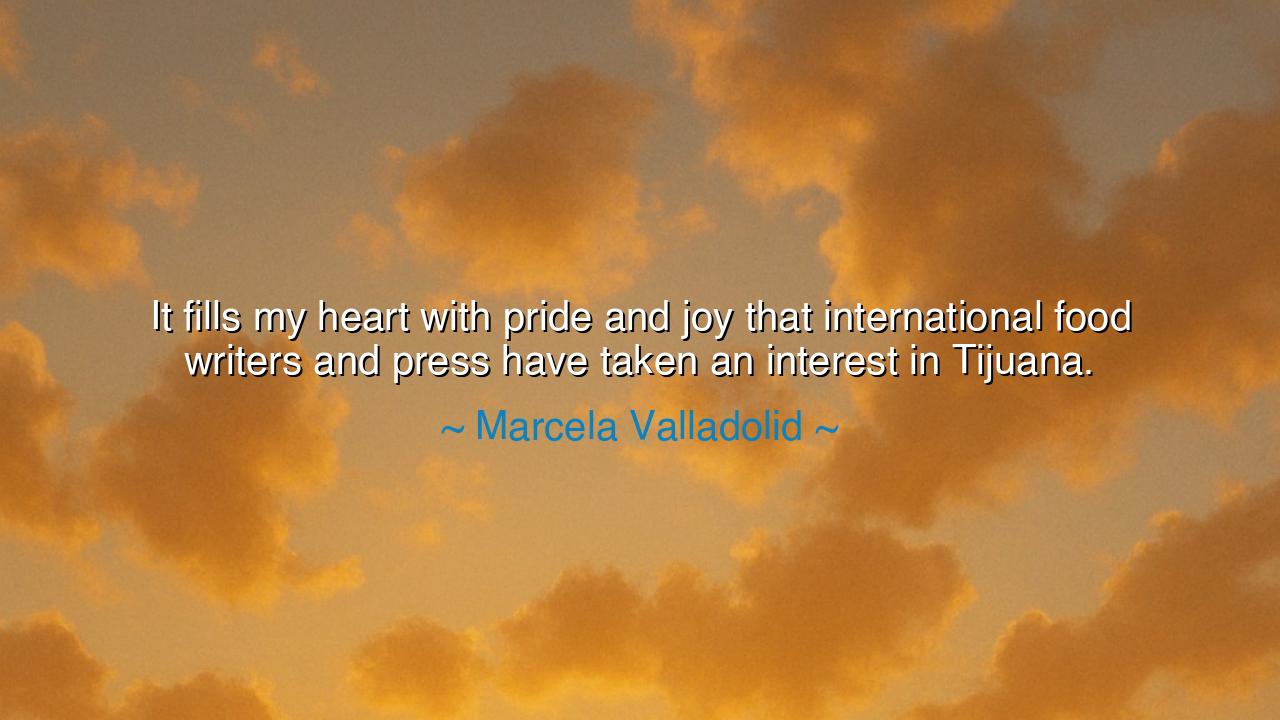
It fills my heart with pride and joy that international food
It fills my heart with pride and joy that international food writers and press have taken an interest in Tijuana.






Host: The gentle light of the evening filled the room, casting soft shadows as the quiet of the world outside drifted in. Jack sat at the table, his cup of tea resting lightly in front of him, his fingers lightly tracing the rim. Jeeny stood by the window, her gaze turned outward, contemplating the words of Marcela Valladolid that Jack had just shared.
Jeeny: “I’ve been thinking about what Marcela Valladolid said: ‘It fills my heart with pride and joy that international food writers and press have taken an interest in Tijuana.’ There’s something so heartfelt about her words, isn’t there? The pride she feels in seeing Tijuana—a city often overlooked in the global conversation—receive the recognition it deserves. It’s like her love for the city and its food is intertwined with a sense of validation and appreciation from the world.”
Jack: “Yes, absolutely. What stands out to me is the connection she feels between her work, the cultural identity of Tijuana, and the growing global recognition of the city’s culinary scene. Tijuana is often overlooked in the broader conversation about Mexican cuisine, but for Valladolid, seeing the international press take notice feels like a celebration of the city’s rich history and culinary traditions. It’s as if the world is finally catching up to what she’s known all along.”
Jeeny: “Exactly. It’s not just about food—it’s about culture, identity, and pride. When the world starts recognizing the uniqueness of a place like Tijuana, it’s a reflection of all the hard work that local chefs, cooks, and food lovers have put into showcasing their city. Valladolid’s pride is about more than just recognition; it’s about the affirmation of Tijuana’s value, its worth in the larger global context.”
Host: The quiet in the room deepened, as if the weight of Valladolid’s words had sparked a reflection on the power of food and culture to bring recognition to often-overlooked places. Jack’s fingers stopped tracing the edge of the cup, and Jeeny’s gaze softened as she absorbed the layers of meaning in her words.
Jack: “It’s fascinating, isn’t it? How food, something as universal as what we eat, can be such a powerful tool for cultural exchange. When people from around the world recognize a city’s culinary scene, they are also recognizing its culture, its history, and its people. Valladolid’s pride isn’t just in the food—it’s in seeing Tijuana’s identity celebrated on a global stage.”
Jeeny: “Yes, and it’s also a reminder that underrated places often hold so much untapped potential. Tijuana might not have been on the map for many international food writers before, but now, thanks to people like Valladolid, it’s emerging as a place where rich flavors and stories are waiting to be discovered. It’s a moment of acknowledgment for the local community—for those who have been working behind the scenes to build something that represents the heart of the city.”
Jack: “Exactly. Recognition isn’t just a matter of fame—it’s about empowering the local community, about giving them the platform to share their unique perspective with the world. Food is such an intimate reflection of a place, of its traditions, its people, and its values. When a city like Tijuana gets recognized for its culinary offerings, it’s not just about a new restaurant or a famous dish—it’s about a whole culture getting the attention it deserves.”
Jeeny: “And I think that’s the beauty of what Valladolid is saying. Her joy comes not just from the recognition of her work, but from the recognition of Tijuana’s culture as a whole. The world is starting to see Tijuana for what it is—not just a city on the border, but a place with its own deep, vibrant identity and its own powerful contribution to the global culinary conversation.”
Host: The room had grown quieter, as the conversation deepened into a shared understanding that food, culture, and identity are intimately linked. The recognition of Tijuana’s culinary scene was more than just about food—it was about celebrating and acknowledging the authenticity and richness of a place and its people. Jack sat back in his chair, his fingers lightly resting on the table, while Jeeny’s gaze softened, the quiet realization that pride and recognition are powerful forces in shaping how we view the world, especially when it comes to cultures and cities that have long been overlooked.
Jack: “So in a way, Valladolid’s pride is a reminder that every place has something unique to offer—it’s just a matter of finding the right audience, the right platform, for it to be seen. Tijuana’s culinary scene is a perfect example of how passion and authenticity can break through and shine on a global scale.”
Jeeny: “Yes, and I think that’s the power of recognition. When you give a place the attention it deserves, you open up a whole new world of possibilities—not just for the people living there, but for everyone who gets to experience it. Valladolid is proud not just for the attention it brings to Tijuana’s food, but for the doors it opens for more stories to be heard, more cultures to be appreciated.”
Host: The room had grown even quieter now, the weight of the conversation hanging in the air. Marcela Valladolid’s words had sparked a deeper reflection on the power of food, culture, and recognition. The idea that the acknowledgment of Tijuana’s culinary scene wasn’t just about food—it was about giving the city the platform to share its true identity with the world—had taken root. The world outside had fully darkened, but inside, there was light—a reminder that the true power of recognition lies in seeing people, places, and cultures for what they truly are.






AAdministratorAdministrator
Welcome, honored guests. Please leave a comment, we will respond soon